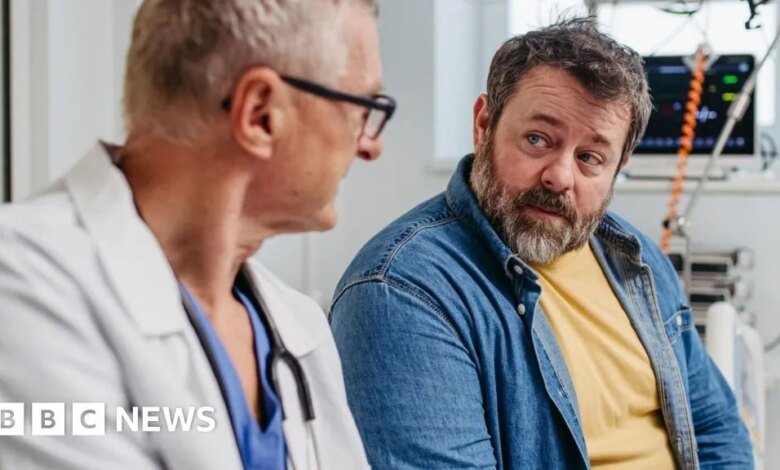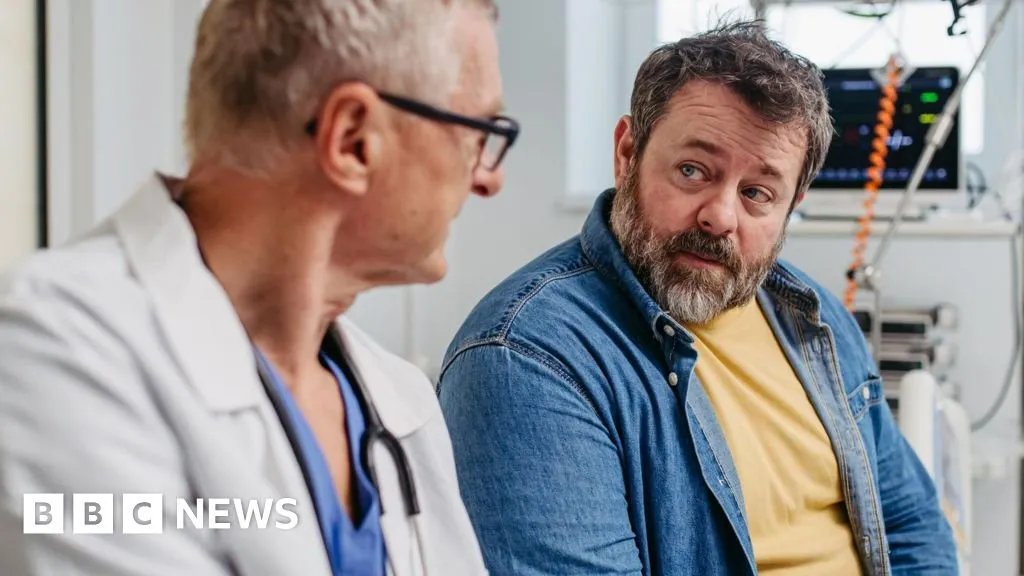Prostate Cancer Symptoms And Treatment: What To Check For

Prostate Cancer Symptoms And Treatment: What To Check For
Michelle RobertsDigital health editor
Former prime minister Rishi Sunak has told the BBC that a targeted prostate cancer screening programme is needed urgently, and would “save countless lives”.
Sunak is an ambassador for the Prostate Cancer Research charity, and made his comments as the UK National Screening Committee reconsiders its 2020 decision not to recommend routine screening.
Not everyone thinks extending screening a good idea though.
Prostate cancers can behave very differently, and while some can spread quickly, others are very slow growing and may need minimal or even no treatment.
What is prostate cancer?
The prostate is a gland that is about the size of a walnut which sits just below the bladder within the pelvis.
It surrounds the urethra – the tube that takes urine out of the body through the penis.
Prostate cancer – abnormal and uncontrolled cell growth – often develops slowly.
There may be no signs or symptoms for years and some people never develop any problems from it.
But in others, the cancer can be aggressive and deadly.
Prostate cancer that’s detected early has the best chance for successful treatment.
How common is prostate cancer?
Prostate Cancer UK says one in eight men will get prostate cancer at some point in their lives.
Around 52,300 men are diagnosed each year in the UK, and there are around 12,200 prostate cancer deaths every year, according to Cancer Research UK.
It is most common in older age – among men over 75. Cases in the under-50s are rare.
Your risk of prostate cancer is higher if you have a close relative – a father, brother, grandfather or uncle – who has had prostate cancer.
It is also more common in black men.
What symptoms should people check for?
The common ones are:
- needing to urinate more frequently – particularly at night
- difficulty starting to urinate, weak flow and it taking a long time
- blood in urine or semen
These symptoms can be caused by other conditions too – but it is important to have any changes checked by a doctor.
Is there a test for prostate cancer?
There is no single, diagnostic test. Doctors make a diagnosis based on various measures.
This can include a prostate-specific antigen (PSA) blood test and a scan, as well as a biopsy, which involves taking a small tissue sample to examine in the laboratory.
PSA tests are not routinely used to screen healthy men for prostate cancer because the results can be unreliable.
A high PSA does not always mean cancer. It can go up if there is an infection, for example.
Some men with a raised PSA may have a prostate cancer that would not have caused problems or needed treatment, causing unnecessary worry and further investigations.
Men over 50 can usually ask their GP for a PSA blood test if they want to. Your GP will explain the potential benefits and risks of having a PSA test.
If you decide you want a PSA test, you should refrain from sexual activity and vigorous exercise, such as cycling, in the two days beforehand as this can affect the results.
Doctors are also considering whether adding MRI scans to PSA tests might improve the situation.
Would a prostate screening programme help?
Researchers have repeatedly looked at whether it would be beneficial to introduce the screening.
Those studies, overall, show that offering all men of a certain age a PSA test would only lead to a small reduction in the number of men dying from prostate cancer.
In 2020, the UK National Screening Committee said it did not recommend screening for the condition.
However, the latest report from Prostate Cancer Research calls for a screening programme targeted at men aged 45–69 with a family history of prostate cancer and black men. This group includes around 1.3 million men in the UK.
The charity estimates the programme would cost £25 million a year – or about £18 per patient – similar to bowel and breast cancer screening.
It says the benefits of introducing targeted screening for those at the highest risk would outweigh the financial and logistical costs.
But others have argued that it would take scanning capacity away from patients being treated for other conditions.
Some medical experts are sceptical about the value of screening. They argue there is still a risk that patients will be treated for the cancer when it is not strictly necessary and will then have to live with side effects such as incontinence and erectile dysfunction.
How is prostate cancer treated?
Different options are available and your doctor will be able to advise which might be most suitable.
If the cancer is at an early stage and not causing symptoms or growing quickly, it might be possible to keep it under observation or “watch and wait”.
Some prostate cancers can be cured with treatments such as surgery and radiotherapy.
Hormone therapy may also slow cancer growth.
It may also be possible to destroy the cancer cells using extreme cold (cryotherapy) or high-intensity focused ultrasound.
Disclaimer: This news article has been republished exactly as it appeared on its original source, without any modification.
We do not take any responsibility for its content, which remains solely the responsibility of the original publisher.
Disclaimer: This news article has been republished exactly as it appeared on its original source, without any modification.
We do not take any responsibility for its content, which remains solely the responsibility of the original publisher.
Author: uaetodaynews
Published on: 2025-10-14 16:09:00
Source: uaetodaynews.com





